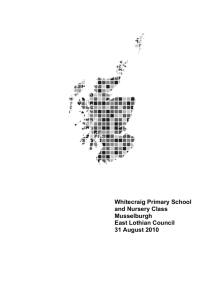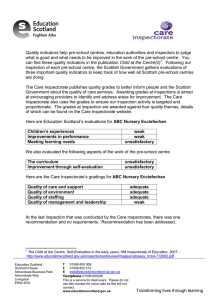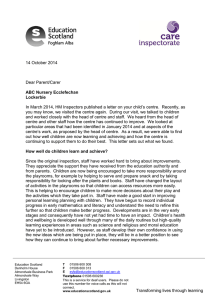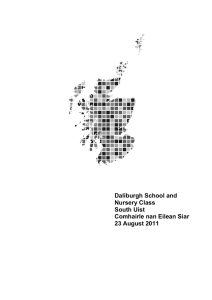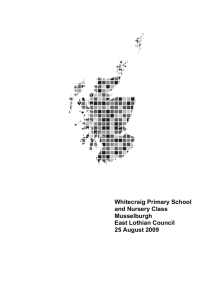Integrated Inspection by the Care Commission and HM Inspectorate of Education of
advertisement
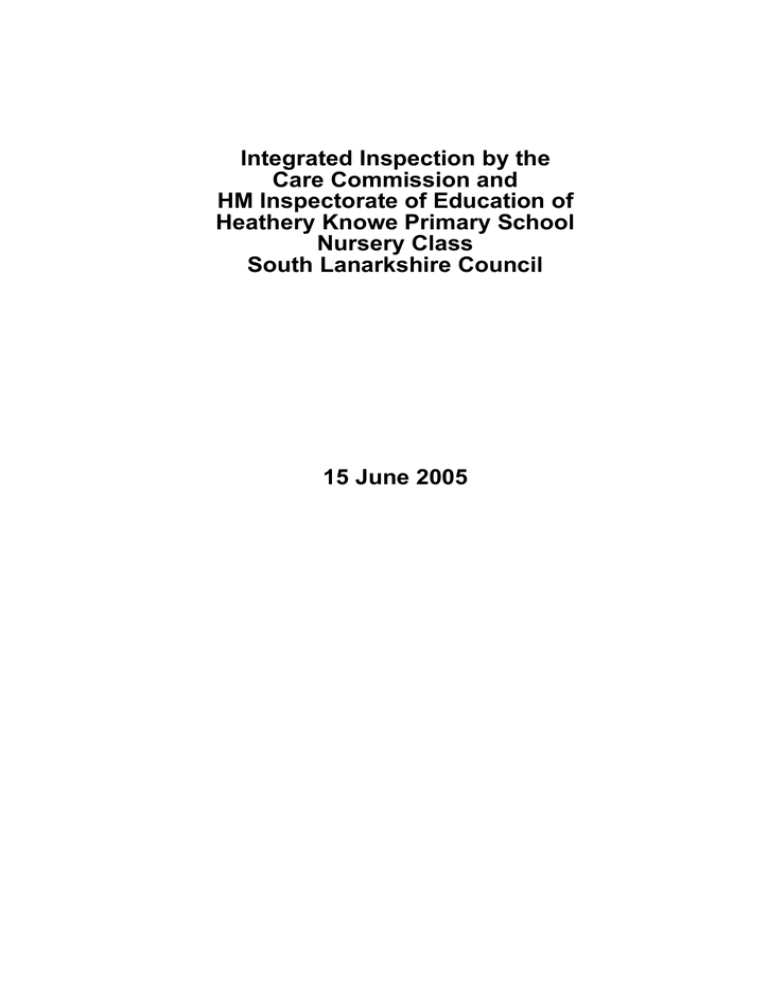
Integrated Inspection by the Care Commission and HM Inspectorate of Education of Heathery Knowe Primary School Nursery Class South Lanarkshire Council 15 June 2005 Heathery Knowe Primary School Nursery Class Whitehills Terrace East Kilbride G75 0NG The Regulation of Care (Scotland) Act, 2001, requires that the Care Commission inspect all care services covered by the Act every year to monitor the quality of care provided. In accordance with the Act, the Care Commission and HM Inspectorate of Education carry out integrated inspections of the quality of care and education. In doing this, inspection teams take account of National Care Standards, Early Education and Childcare up to the age of 16, and The Child at the Centre. The following standards and related quality indicators were used in the recent inspection. National Care Standard Child at the Centre Quality Indicator Standard 2 – A Safe Environment Resources Standard 4 – Engaging with Children Development and learning through play Standard 5 – Quality of Experience Curriculum Children’s development and learning Support for children and families Standard 6 – Support and Development Standard 14 – Well-managed Service Management, Leadership and Quality Assurance Evaluations made using HMIE quality indicators use the following scale, and these words are used in the report to describe the team’s judgements: Very good Good Fair Unsatisfactory : : : : major strengths strengths outweigh weaknesses some important weaknesses major weaknesses Reports contain Recommendations which are intended to support improvements in the quality of service. Any Requirements refer to actions which must be taken by service providers to ensure that regulations are met and there is compliance with relevant legislation. In these cases the regulation(s) to which requirements refer will be noted clearly and timescales given. HOW TO CONTACT US Copies of this report have been sent to the headteacher, staff and the education authority. Copies are also available on the Care Commission website: www.carecommission.com and HMIE website: www.hmie.gov.uk. Should you wish to comment on or make a complaint about any aspect of the inspection or about this report you should write either to the Care Commission or to HM Inspectorate of Education at the address below. If you are still dissatisfied with our services, you can contact your member of the Scottish Parliament (or, if you prefer, any other MSP). You can also contact the Scottish Parliamentary Ombudsman. The Ombudsman is fully independent and has powers to investigate complaints about Government departments and Agencies. Complaints Coordinator Headquarters Care Commission Compass House Riverside Drive Dundee DD1 4NY Hazel Dewart HM Inspectorate of Education Denholm House Almondvale Business Park Almondvale Way Livingston EH54 6GA Crown Copyright 2005 Care Commission HM Inspectorate of Education This report may be reproduced in whole or in part, except for commercial purposes or in connection with a prospectus or advertisement, provided that the source and date thereof are stated. _______________________________ Integrated Inspection by the Care Commission and HM Inspectorate of Education of Heathery Knowe Primary School Nursery Class South Lanarkshire Council Introduction Heathery Knowe Primary School Nursery Class was inspected in February 2005 as part of the integrated inspection programme by the Care Commission and HM Inspectorate of Education. The nursery catered for pre-school children aged three to five years. At the time of the inspection the roll was 60. The environment Standard 2 The nursery was located in the main primary school building. Staff made good use of the accommodation. Displays of children’s art work and photographs in the entrance area contributed to the welcoming environment. The nursery provided an appropriate range of resources which were accessible to the children. Children played and worked independently, in small groups and in larger group settings. Staff should continue to develop the risk assessment systems for the rooms and play equipment. Appropriate measures were in place to control the spread of infection. The outdoor play area had a soft surface and was safely enclosed within the school. The headteacher and staff had identified the need to review and improve the use of the outdoor play area to enhance children’s learning experiences. The nursery had a secure entry system. All fire prevention and safety checks were being undertaken and records maintained. A number of the light fittings should be repaired. The fire risk assessment was in the process of being updated. Quality of children’s experience Standard 4 & 5 Staff were well informed about children’s development and learning. They were patient and caring and made effective use of praise to encourage and promote children’s self esteem and confidence. Children were happy and enthusiastic learners. They had access to a good range of learning experiences and were able to make choices. The majority of children concentrated well on their chosen activities. However, staff needed to review and improve the pace and balance of the day to provide additional opportunities for children to become more absorbed in play 1 activities. This would also allow staff to engage more effectively with children to support and further extend their learning. Staff had developed good procedures for planning, assessment and reporting. They planned a range of themes and seasonal activities. Plans set our clearly what children were expected to learn. Staff made regular observations of children at play. However, they needed to make more effective use of assessment information to ensure that the needs of all children were being met at all times. Features of the programmes for children included the following. 2 • The programme for emotional, personal and social development was good. Children had good opportunities to learn about and celebrate festivals throughout the year. They were making friends and learning to share with one another during play. Most children were familiar with the daily routines and the rules of good behaviour. They were developing good hygiene practices in washing hands before snack and brushing teeth. Staff encouraged children to take some responsibility for simple tasks such as tidying away toys. • The programme for communication and language was good. Children enjoyed reciting familiar rhymes and listening to stories being read by an adult. They spoke well to each other and to adults. However, they would benefit from more opportunities to develop talking and listening skills in a variety of situations. Some children could recognise their own name in print. They would benefit from further opportunities to extend their skills in early reading and writing through play activities. • The programme to develop children’s knowledge and understanding of the world was good. Staff made effective use of visitors to extend children’s knowledge of the environment. They offered children good opportunities to observe seasonal change. However, there was scope for more learning opportunities using the outdoor environment. Children had opportunities to play in sand and water and they made good use of the computer. They were learning to count and to recognise patterns. However, they needed more stimulating activities to encourage them to explore, experiment and investigate. • The programme for expressive and aesthetic development was good. Children played imaginatively in the home corner and with the dolls’ house. They had regular opportunities to dance and sing songs. A few children used percussion instruments to make their own music. Staff provided children with a variety of art and craft resources to develop their skills in painting, printing and gluing. Children would benefit from more opportunities to develop their own ideas in art. • The programme for physical development and movement was good. Staff gave children frequent opportunities to use a range of tools and small construction toys. Children were developing good control of their fingers and hands. They had daily opportunities for indoor physical play in one of the playrooms. They were learning to balance and jump. They also had access to the school gym once a week for physical activity. They participated in all indoor physical activities enthusiastically. Staff needed to provide children with more regular opportunities to take part in energetic play outdoors. Support for children and families Standard 6 Staff offered very good support to children and families. They responded well to individual needs and circumstances. Parents who responded to the pre-inspection questionnaire were very satisfied with most aspects of the nursery’s work. Staff received very good support from parents. They worked with parents to support the work of the nursery and had recently been able to purchase laptop computers to support children’s learning at home. There was a good planned programme for children transferring to primary school. Information on children’s progress was shared with parents and with the receiving P1 teachers. The nursery provided very good support for children who required additional support in their learning. Staff were developing individualised educational programmes. The headteacher and staff had established very good links with support agencies and other professionals. Management Standard 14 The headteacher and depute headteacher provided very good leadership. The management team had a clear vision for the continuing development of the service. The depute headteacher had day-to-day responsibility for the nursery. The staff team were approachable and supportive. They were respected and highly valued by parents and the headteacher. The management team kept staff informed about all matters relating to the nursery through regular meetings. The nursery had effective systems in place to maintain records and they had developed a range of appropriate policies and procedures. Staff were clear about their responsibilities and duties and felt well supported by the management team. They followed the local authority child protection guidelines and were aware of the Scottish Social Services Council’s codes of practice. The management team carried out an effective system of staff review. Staff had appropriate qualifications in education and childcare and took part in a range of relevant development and training activities. The ratio of staff to children was in line with guidelines. However, there was a need to ensure that the ratio was maintained during each nursery session. Parents volunteered with a range of activities including assisting in the playrooms, trips and visits. The management team should review the use of volunteers in line with local and national advice. The management team had developed procedures for monitoring and evaluating the work of the nursery. These included seeking the views of the staff team and parents on aspects of provision. They made effective use of the information to improve the quality of children’s experiences. An appropriate development plan was in place and priorities were being addressed and implemented. 3 Key strengths • Happy children who were enthusiastic learners. • The very positive relationships between staff, children and their families. • The very good leadership provided by the headteacher and depute headteacher. Other Issues Response to recommendations or to requirements made at previous inspection Six areas for improvement which included one requirement and five recommendations were identified at the last inspection. An Action Plan was received subsequent to the inspection detailing how these issues would be addressed. The requirement and four of the recommendations have been met. The recommendation with regard to the vetting of all volunteers had still to be fully implemented. Recommendations for improvement • The management team should review and improve the pace and balance of the day to allow staff to engage more effectively with children at all times. • Staff should make more use of assessment information to ensure that all children were appropriately challenged at all times. • Staff should improve the programmes as mentioned in the report. • The management team should review the use of volunteers. Care Commission Officers and HM Inspectors have asked the pre-school centre and education authority to prepare an action plan indicating how they will address the main findings of the report. Where requirements are made, the action plan should include timescales to deal with these. The plan will be available to parents and carers. In liaison with the pre-school centre and education authority, Care Commission Officers and HM Inspectors will monitor progress to ensure improvements are in line with the main findings of the report. Kuldip Dhesi Care Commission 4 Sheona Moore HM Inspectorate of Education
